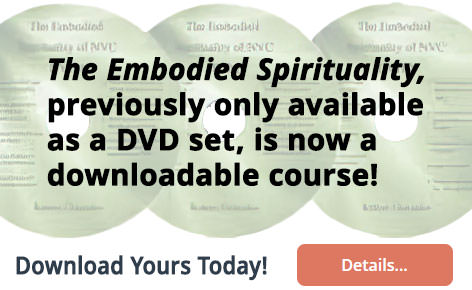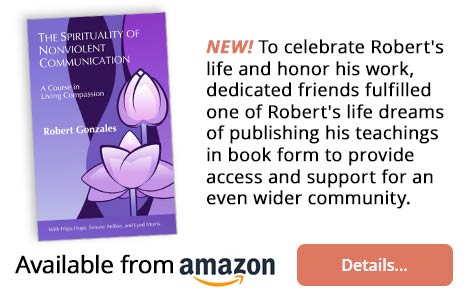

Welcome to the Robert Gonzales Training Legacy. Here you can learn more about Robert and the powerful teachings he dedicated his life to. NVC Academy is proud to house and share with you the complete body of his life's work. We invite you to explore, learn, and help keep his legacy alive!
Robert's passion was in the spirituality of the Nonviolent Communication (NVC) process. He saw NVC both as a process that helps people connect more authentically with themselves and others, and as a spiritual practice and way of living. The worldwide NVC community mourned when Robert died in 2021. He left behind a legacy of work that emerged from a lifetime of inquiry into the intersection between spirituality and human communication. More about Robert.
Article
9 - 13 minutes
Reveal what’s in your heart before asking a question to help build trust, especially if you're in an authority figure. Otherwise, your question may sound like a demand, blame, trap, intrusion or accusation, and it may elicit a defensive response. If you get a "question" like that, give them empathy. Read on for reflection questions to see how our revealing and our withholding impacts our relationships with others and with ourselves.
Details...Practice Exercise
8-12 minutes
When deciding if someone crossed your boundaries and how to respond, you may get conflicting opinions on it. These opinions can be coarse attempts to manage life with rules about what should(n’t) happen. Instead, so that you can find where you want to invest your energy, ask yourself questions that reveal what for you is truly in integrity, nourishing, connects to your heart, and deepens self understanding. Read on for examples.
Details...Article
7-10 minutes
Read how an American Buddhist NVC teacher with Jewish roots reflects on how any dehumanization in the Israel-Hamas conflict can be used to justify all kinds of violence that can escalate for generations. With acknowledgment of the complexities, his desire is for us to bring in respect, dignity and peace -- for both Israelis and Palestinians. He emphasizes compassionate advocacy of all humanity amid the ongoing crisis.
Details...Article
3 - 5 minutes
Anxiety comes in different flavors: worry, restlessness, over-stimulation, distress, uncertainty, or panic. While fear involves an imminent threat, anxiety is often more amorphous and related to a vague and distant future. We can try out a few ways to transform anxiety: label the emotion, notice how we relate to the anxiety, release the story and reconnect somatically, plus apply self care and self empathy.
Details...Article
16 - 24 minutes
We can create processes that encourage resources (particularly money) to flow to where they are most needed. Engaging in "money piles" is one new way that can refocus conversations on real, practical problems to solve -- rather than ideological or abstract discussions about who "earned", "deserved", worked "harder", or merits more. It can tilt conversations based on transaction and obligation towards care and relationship. Read on for three examples that further illustrate how this new way of operating may even bring us closer to the type of world we all want to live in.
Details...Article
23 - 34 minutes
The pandemic has unsettled deep patterns of consumption. There’s a fear, and with it comes the mindset that is the heart of rampant consumption; habits which are essential to the market economy’s “economic recovery”. High consumption is also the most direct cause of environmental degradation. What do we need in order to significantly reduce consumption for our greater resilience and freedom, and to increase our planetary and human sustainability?
Details...Article
4 - 6 minutes
When it comes to self-sabotage and self-limitation, what's happening when we make ourselves smaller than we are? And what is it with the crippling experience we suffer when we exceed our own self-imposed limitations? What unconscious needs is your nervous system meeting by remaining small? Read on for the insights of Beatrice Beebe's research on biological imperatives, emotional language, and emotional limitations.
Details...Article
4 - 6 minutes
To express opposition without stimulating distress, stop judging and look for ways to honor, understand, and have compassion for others. You can do this by finding a point of agreement. For example, you can agree with part of what they said. Or if you completely disagree, you can express what greater understanding, inspiration, appreciation or empathy you have in response to what they're saying. Read on for more on this, plus, ten sentence stems to get you started.
Details...Article
16 - 24 minutes
Instead of allocating resources based on needs, we cling to having more money or privilege than others because its close enough substitute for our deeper longing. We may cling to narratives that seem to legitimize this inequality as something we deserved -- such as earning it; having more talent or ability; or needing more for company growth. This soothes our discomfort of having more than others. But these narratives still block us from genuinely getting in touch with the needs of life.
Details...Video
5 minutes
As human beings, our inherent goodness makes most of us believe in equality and yet sometimes our conviction in this same 'goodness' may make us blind to the reality of our own behavior. We are so convinced about the innocence of our intention that we seize to look at the impact of our behavior and thus our unconscious biases often go unexamined and unchallenged. Diversity, equity and inclusion work will only be of lip-service until we are willing to look at our own unconscious biases. Listen as Anisha Pandya encourages you to look at the possibility of how our self-awareness is so limited and one of the ways of expanding that awareness is by moving beyond our intention, looking at the impact of our behavior and remaining open to feedback.
Details...

